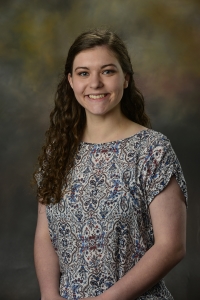 Student Research Spotlight - Natalie Williams
Student Research Spotlight - Natalie Williams
Natalie Williams won first place in the category, University-Wide Undergraduate Student Winners in Science, Technology, Engineering and Mathematics, during the 2020 Auburn Research: Virtual Student Symposium.
Hometown: Huntsville, Alabama
Major and degree: Bachelor’s Degree in Microbiology
College: Sciences and Mathematics
Department: Biological Sciences
Class year: 2021
Faculty mentor: Mark Liles
Preventing Microbial Contamination of NASA’s Europa Lander Mission
What are you researching?
Europa is an ice-covered moon of Jupiter and is a prime candidate in NASA’s search for extraterrestrial life. Our main objective is to limit the number of organisms on the spacecraft prior to launch so the risk of contaminating Europa will be low. We have discovered from our research that specific adhesives, such as Loctite EA9394, can kill spore-forming bacteria and tardigrades (a very tough kind of animal also known as a “water bear”), which can both survive the harsh environment of space.
How could the results benefit individuals, agencies or companies?
We are currently testing different adhesives with different insulation materials that can be used on the solid rocket motor of the Europa Lander. These data will be used to select the optimal combination of insulation with adhesive to reduce microbial contamination, and provide guidance for the final launch risk assessment for this NASA mission. This will help us get one step closer to landing on Europa’s icy crust!
Tell us why you enjoy research.
One of the things I enjoy most about research and this project in particular is the opportunity to collaborate with people in fields outside of my own wheelhouse. Microbiologists, NASA scientists and engineers of all expertise are a part of this team striving to reach a common goal. Space exploration inherently creates novel problems that can only be solved with this kind of collaboration, and it is always really exciting.
What advice would you give to other students considering doing a research project?
Research can develop many practical skills if you apply yourself and continue to ask questions. One of the most useful of these skills is critical thinking and is really beneficial to a student or anyone who desires to be a lifelong learner. I used to think this just meant being capable of solving a physics problem, but really it is the manner of troubleshooting and experimental design that accompanies the use of the scientific method, and I think that is a beautiful thing.
Tell us about any hobbies or activities you enjoy.
Enjoying nature, especially in national parks, is probably my favorite hobby. My favorite park right now is Zion National Park in Utah; you can see me at the peak of Angel’s Landing in one of the above photos, which is one of my favorite hikes! I love backpacking, skiing, caving, mountain biking and really anything that involves being outside.
Back to Research Spotlight homepage


